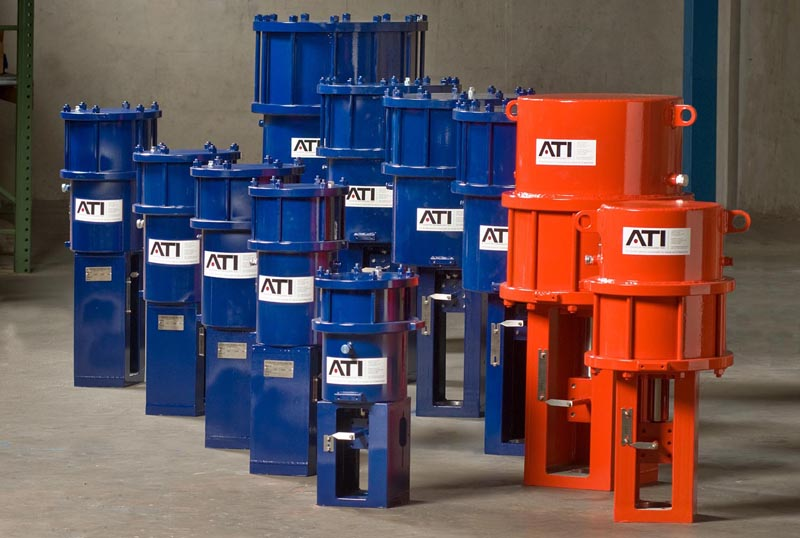M
Articles/News
Since our founding in 1995, we have specialized in flow control
and valve automation with an unwavering Vision.
Home |
Why Use Pneumatic Valve Actuators?
Valve actuators, used for operating valves for opening, closing or modulating service, come in a variety of configurations and power sources. Two of the most recognizable types based on these criteria are pneumatic and hydraulic. Each has positives and negatives depending in part on the specific application, space requirements, operating pressures and speeds needed for safe valve operation.
Even on a single application, there can be a combination of both pneumatic and hydraulic valve actuators. In remote locations, where neither compressed air nor electricity is available, hydraulic is often the choice.
In refineries, chemical plants and pipeline compressor stations, where compressed air sources are available, the features and capabilities of a pneumatic actuator are usually more favorable.
Pneumatic actuators valve
Pneumatic actuators are designed to operate a piston within a closed cylinder. Pressure from an external air or gas source powers the actuator, moving the cylinder to fully open or close the valve, or partially modulate its open/close movement.
Depending on the valve type, the pneumatic actuator valve can either operate in a 90-degree horizontal direction or in a linear up and down motion.
Hydraulic actuators
Hydraulic actuators operate similarly to pneumatics except the power medium is a non-compressible fluid which, if leaked, can have potentially dangerous effects. Both pneumatic and hydraulic actuators can be configured either with a compressible spring that extends or retracts the piston, or a design with an air or liquid inlet on either side of the piston that allows double-acting operation.
Some of the uses of pneumatic valve actuators
Pneumatic valve actuators are typically used in oil refineries, chemical plants, power plants, water treatment, marine terminals and mining. They are usually made from materials like stainless steel, carbon steel and aluminum.
For industries that have complex pipe and product delivery conduits, stainless steel pneumatic valve actuators are used to manage corrosive liquids.
Precise flow and direction of corrosive liquids, dangerous fluids, and chemicals require robust hardware capable of working under high and heavy payloads. The hardware must also be able to maintain precision movement and flow direction with intricate pipe networks. These systems require the power of pneumatic valve actuators to function properly. Pneumatic actuators offer a range of commercial advantages above and beyond hydraulic actuators.
Pneumatics have certain advantages
There are many advantages in choosing pneumatic actuators over both hydraulic and electric when all sources are available:
-
- The risk of contamination from its power supply is minimal. That allows its design to be simplified and it to be used in applications where cleanliness is a must – pharmaceuticals and food and beverage are good examples.
- Pneumatic valve actuator generally require minimal maintenance.
- Pneumatic actuators can often be designed smaller, lighter and more responsive because air compressibility has little or no resistance. When additional stroking power is needed, cylinder sizes can be enlarged.
- They can often be preferred in applications where rapid opening or closing is required.
- Pneumatic actuators are versatile in their applications and environments. They can usually operate at a wide range of temperatures, from -40° F to +250° F.
ATI’s extensive experience is here to help you
For over 25 years, ATI has specialized in valve automation and flow control with unwavering vision. We offer customized industrial valve actuators to meet your exact specifications. As part of our process, our team will take the time to learn exactly what you need and we’ll work closely with you to create the appropriate solution.
ATI has extensive expertise in pneumatic and hydraulic valve operation, in both linear and quarter-turn configurations for virtually any application. We pride ourselves on offering the highest quality valve automation solutions in the industry.
ATI offers a free consultation and quote
If you are interested in our services, please feel free to contact us at any time for a free consultations and quote.
During your consultation, we will ask all the right questions, and it’s an ideal opportunity for you to do the same. Our team will not rush as we want to ensure we can arrive at a solution that not only meets all your requirements but is also affordable.
If you would like more information about ATI’s actuators and what they can do for your business, please contact us at salesteam@atiactuators.com or 713-903-3743.
FAQs about Pneumatic Actuators for Valves
What are the various control components in a hydraulic actuation system?
There are three control components that make up a hydraulic actuation system. These include –
- Hydraulic Pumps unit
- Control Values
- Reciprocating Or Rotary Unit
What are the different types of pneumatic valves?
Pneumatic valves can be classified into 4 types, including –
- Direction control valves
- Non-return valves
- Flow control valves
- Pressure control valves
What is the usual life span of pneumatic actuators?
In most cases, pneumatic actuators last for three years.
Are their valves available that allow for adjustable airflow?
Yes, in case you need it, you can get valves that facilitate adjustable airflow. Such valves are usually equipped to help adjust the speed, direction, and noise of the air.

